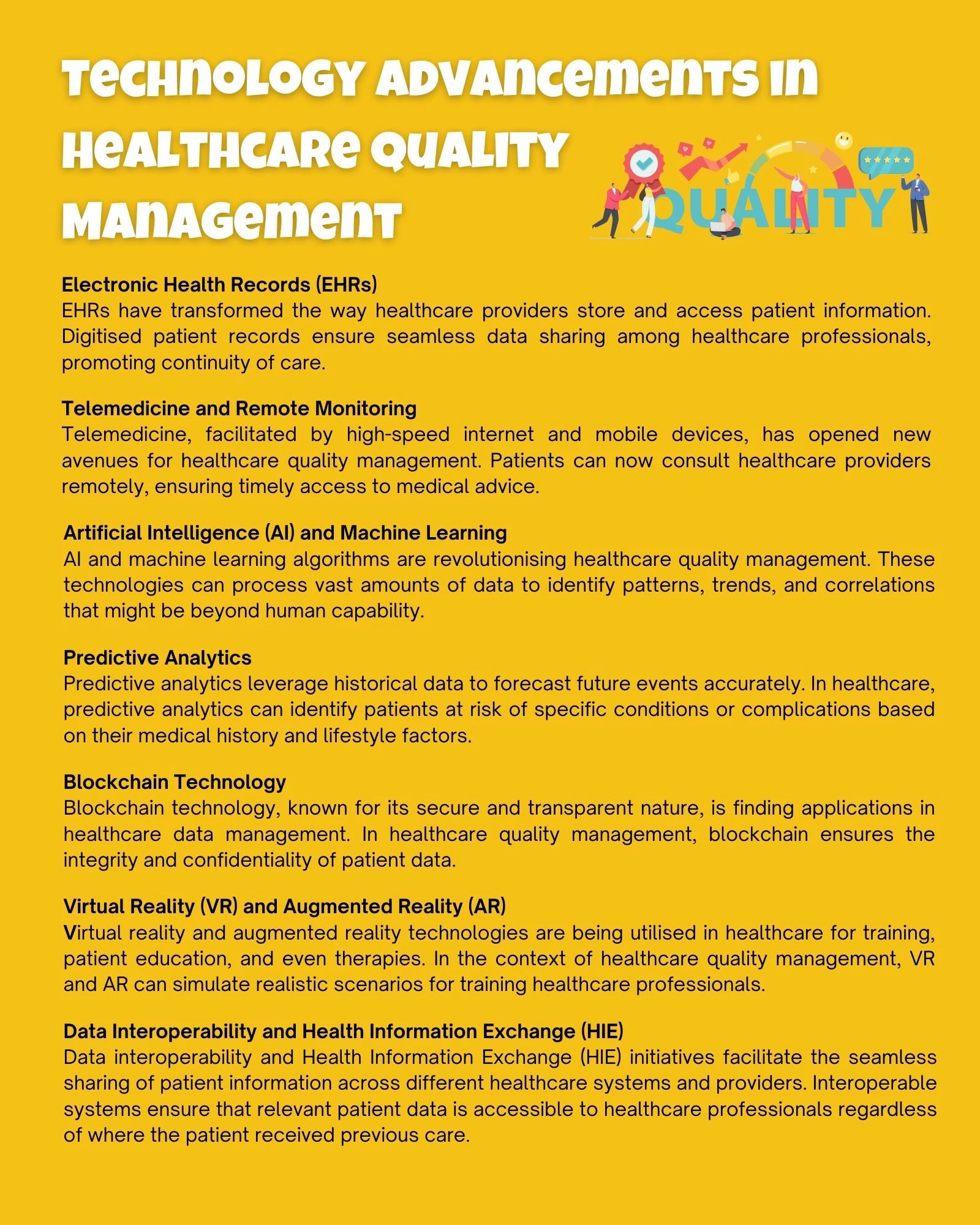- Table of Contents
- Introduction
- What Is Healthcare Quality Management?
- Challenges of Measuring Healthcare Quality
- Diverse Outcome Measures
- Data Collection and Standardisation
- Subjectivity and Patient Perspectives
- Resource Constraints
- Ethical Considerations
- Cultural and Societal Influences
- What Makes Healthcare Quality Management So Vital?
- Improved Patient Outcomes
- Patient Satisfaction and Trust
- Cost Savings for Healthcare Systems and Patients
- Reputation and Accreditation
- Improved Public Health and Population Health Outcomes
- Legal and Ethical Compliance
- Research and Innovation
- The 7 Best Strategies in Healthcare Quality Management
- 1- Establishing a Culture of Quality
- 2- Data-Driven Decision Making
- 3- Implementing Clinical Practice Guidelines
- 4- Emphasising Patient Safety
- 5- Continuous Quality Improvement
- 6- Engaging and Empowering Healthcare Providers
- 7- Patient Engagement and Education
- Technology Advancements in Healthcare Quality Management
- Electronic Health Records (EHRs)
- Telemedicine and Remote Monitoring
- Artificial Intelligence (AI) and Machine Learning
- Predictive Analytics
- Blockchain Technology
- Virtual Reality (VR) and Augmented Reality (AR)
- Data Interoperability and Health Information Exchange (HIE)
- Conclusion
Introduction
Pursuing quality and safety is paramount in the complex and ever-evolving healthcare landscape. Healthcare quality management is crucial in ensuring patients receive the best care and outcomes. It encompasses a range of processes and strategies designed to monitor, evaluate, and improve the quality of healthcare services. In this blog post, we will delve into the concept of healthcare quality management, discuss the challenges associated with measuring healthcare quality, explore the significance of effective quality management, and present the seven best strategies to enhance healthcare quality management.
What Is Healthcare Quality Management?
Healthcare quality management can be defined as a comprehensive approach to monitoring and enhancing the quality and safety of healthcare services provided to patients. It involves systematically evaluating and improving various aspects of healthcare delivery, including clinical outcomes, patient satisfaction, safety protocols, operational efficiency, and compliance with regulatory standards.
Healthcare quality management ensures patients receive evidence-based, safe, timely, efficient, equitable, and patient-centred care. It involves the collaboration of healthcare professionals, administrators, policymakers, and patients themselves, with a shared commitment to continuous improvement.
Challenges of Measuring Healthcare Quality
Measuring healthcare quality poses several challenges due to healthcare outcomes' complexity and subjective nature. Some of the key challenges include:
Diverse Outcome Measures
Measuring healthcare quality is complicated by the diverse array of outcome measures involved. Clinical outcomes encompass everything from survival rates to postoperative complications, challenging standardising evaluation criteria across different medical specialities. Patient experiences, another vital aspect of healthcare quality, add further complexity. These subjective measures often vary based on cultural backgrounds, individual preferences, and communication skills, necessitating nuanced approaches to interpretation and assessment.
Data Collection and Standardisation
The issue of data collection and standardisation in healthcare quality management is multifaceted. Healthcare systems often operate with disparate electronic health record (EHR) systems that don't communicate seamlessly. This lack of interoperability means critical patient information might not be readily available to healthcare providers. Furthermore, data collection methods can vary between institutions and different departments of the same hospital. Standardising these processes requires technological advancements and demands a cultural shift towards unified data reporting practices across the industry.
Subjectivity and Patient Perspectives
Incorporating subjective measures, particularly patient perspectives, into healthcare quality assessments presents a unique challenge. Various factors, including emotional state, expectations, and previous encounters with the healthcare system, influence patients' perceptions of their healthcare experience. For example, a patient's satisfaction with their care might be influenced by factors such as the communication skills of the healthcare provider, wait times, and the cleanliness of the facility. Striking a balance between qualitative and quantitative data is essential to comprehensively evaluate healthcare quality, as it ensures a more holistic understanding of the patient experience.
Resource Constraints
Resource constraints in measuring healthcare quality are pervasive. Limited funding often impedes the implementation of comprehensive quality measurement initiatives. This constraint affects the ability to hire skilled professionals for data analysis, inhibits the development of sophisticated data collection tools, and restricts implementing large-scale quality improvement programmes. Moreover, time constraints faced by healthcare professionals hinder their ability to collect and analyse data thoroughly, potentially leading to incomplete or inaccurate assessments of healthcare quality.
Ethical Considerations
Beyond the technical and logistical challenges, measuring healthcare quality involves ethical considerations. It is paramount to balance the need for data collection to improve quality with patient privacy and confidentiality concerns. Rigorous measures must be in place to safeguard patient data, ensuring that it is anonymised and securely stored. Additionally, the use of patient data for quality measurement and research purposes must adhere to stringent ethical guidelines, protecting vulnerable populations and respecting patient autonomy.
Cultural and Societal Influences
Cultural and societal factors significantly impact how healthcare quality is perceived and measured. Different cultures have varying attitudes towards healthcare, influencing patient expectations and the acceptance of certain medical interventions. Societal beliefs, stigma, and socioeconomic disparities also play a role in shaping healthcare quality perceptions. Understanding and navigating these cultural and societal influences are essential for accurate and meaningful assessments of healthcare quality, as they affect both patient experiences and healthcare outcomes.
Navigating these multifaceted challenges requires a collaborative effort from healthcare professionals, researchers, policymakers, and technology experts. Addressing these issues is crucial not only for accurate quality measurement but also for fostering trust in healthcare systems and ensuring the delivery of patient-centred care. As the healthcare industry evolves, finding effective solutions to these challenges remains a priority, allowing for more precise and meaningful evaluations of healthcare quality.
What Makes Healthcare Quality Management So Vital?
According to Mordor Intelligence, the Healthcare Quality Management Market will experience a compound annual growth rate (CAGR) of 13.9% by 2027. This growth rate projection indicates a strong and promising future for the Healthcare Quality Management Market. It suggests increasing recognition of the importance of healthcare quality management in driving improved patient outcomes, safety, and operational efficiency. Let’s now discuss why such effective healthcare quality management is that important:
Improved Patient Outcomes
One of the fundamental reasons healthcare quality management is vital is its direct impact on patient outcomes. When healthcare providers adhere to evidence-based practices and safety protocols, patients receive treatments that are proven to be effective and safe. Through continuous monitoring and improvement, medical errors are minimised, adverse events are reduced, and patient outcomes are significantly enhanced. This focus on evidence-based care ensures that patients receive the right treatments and experience faster recoveries and improved overall health.
Patient Satisfaction and Trust
Effective healthcare quality management is synonymous with patient satisfaction and trust. High-quality care translates into positive patient experiences, fostering trust between patients and healthcare providers. Patients who feel heard, understood, and well-cared for are more likely to be satisfied with their healthcare experiences. This satisfaction leads to better compliance with prescribed treatments and encourages patients to engage proactively in their healthcare journey. Trust in the healthcare system is essential; it empowers patients to make informed decisions about their health, creating a positive cycle of trust, engagement, and improved outcomes.
Cost Savings for Healthcare Systems and Patients
Quality management strategies in healthcare optimise resource utilisation, leading to significant cost savings. By focusing on preventive measures, efficient workflows, and reducing unnecessary interventions, healthcare providers can minimise resource waste. Preventable complications, hospital readmissions, and medical errors are costly both for healthcare systems and patients. When these issues are minimised through effective quality management, substantial cost savings are achieved. Patients also benefit from reduced out-of-pocket expenses related to avoidable medical complications, creating a financial relief that contributes to overall well-being.
Reputation and Accreditation
In the competitive healthcare landscape, reputation is everything. Hospitals and healthcare organisations consistently providing high-quality care build strong reputations within their communities. Positive patient experiences and successful outcomes lead to word-of-mouth referrals, attracting more patients and skilled healthcare professionals. Additionally, accreditation bodies recognise and reward organisations that are committed to quality. Achieving accreditation is a testament to an institution's dedication to providing exceptional care, enhancing its reputation further. A positive reputation attracts patients and fosters collaborations with other healthcare providers and institutions, creating a network that facilitates knowledge sharing and best practices.
Improved Public Health and Population Health Outcomes
On a larger scale, healthcare quality management contributes to improved public health outcomes. When healthcare systems prioritise preventive care, timely interventions, and evidence-based treatments, the population's overall health improves. By focusing on population health strategies, such as vaccination programmes, disease screenings, and health education initiatives, healthcare providers can prevent the spread of diseases and promote healthier lifestyles. This proactive approach to healthcare enhances the quality of life for individuals and contributes to the overall well-being of communities and nations.
Legal and Ethical Compliance
Adhering to healthcare quality standards ensures legal and ethical compliance. Healthcare providers are bound by regulations and ethical codes that require them to deliver a certain standard of care. Effective quality management ensures these standards are met, mitigating legal risks associated with malpractice claims and ethical concerns. By following established guidelines and protocols, healthcare organisations safeguard both their reputation and legal standing, reinforcing the importance of consistent quality management practices.
Research and Innovation
Quality management fosters a culture of continuous improvement and innovation within healthcare organisations. Through data-driven insights and quality assessments, healthcare providers can identify areas for improvement. This feedback loop encourages ongoing research to develop better treatments, innovative medical technologies, and improved healthcare delivery methods. The quest for quality often drives healthcare professionals to explore new avenues, leading to groundbreaking discoveries and advancements in medical science. As a result, quality management becomes a catalyst for research and innovation, shaping the future of healthcare.
Healthcare quality management is vital because it directly impacts patient outcomes, fosters patient satisfaction and trust, leads to substantial cost savings, enhances institutional reputation and accreditation, improves public and population health, ensures legal and ethical compliance, and drives research and innovation. By prioritising healthcare quality management, healthcare systems can provide the best possible care to patients, fostering a healthier society and driving positive health outcomes for all.
The 7 Best Strategies in Healthcare Quality Management
1- Establishing a Culture of Quality
Creating a quality culture within healthcare organisations is foundational to effective healthcare quality management. This strategy involves instilling a collective mindset among staff where quality is not merely a task but an inherent part of their professional identity. It starts with leadership setting clear quality goals and expectations. Through transparent communication, healthcare professionals understand their roles in ensuring quality care. Accountability mechanisms are established, ensuring that every team member is responsible for their part in the quality management process. Collaboration becomes key, fostering teamwork and mutual support. Continuous learning and improvement are encouraged, prompting healthcare staff to stay updated with the latest research and best practices. In such an environment, quality management becomes ingrained in the organisational DNA, shaping every decision and action.
2- Data-Driven Decision Making
Leveraging the power of data is indispensable in healthcare quality management. Robust data analytics and information systems allow healthcare providers to collect, store, and analyse vast amounts of information. Data-driven decision-making involves not only gathering data but also interpreting it effectively. Patterns and trends are identified through sophisticated data analysis, offering valuable insights into healthcare quality. These insights enable evidence-based decision-making, allowing healthcare professionals to identify areas for improvement accurately. From patient outcomes to operational efficiency, data-driven approaches provide a holistic view of healthcare processes, guiding interventions and ensuring that resources are directed where they are most needed.
3- Implementing Clinical Practice Guidelines
Clinical practice guidelines are evidence-based recommendations for healthcare professionals to follow in specific clinical situations. Implementing these guidelines standardises care delivery, reducing unwarranted variations in practice. By adhering to established guidelines, healthcare providers ensure that patients receive care based on the latest research and best practices. Regular updates and dissemination of these guidelines are vital, keeping healthcare professionals abreast of the evolving medical landscape. Standardisation improves patient outcomes by ensuring consistent care and simplifies training and knowledge transfer among healthcare staff, fostering a unified approach to quality healthcare delivery.
4- Emphasising Patient Safety
Patient safety is at the core of healthcare quality management. Robust safety protocols, such as medication reconciliation, infection control measures, and error reporting systems, are implemented to minimise patient harm. Stringent safety measures significantly reduce medication errors, hospital-acquired infections, and other preventable incidents. Moreover, fostering a culture where reporting errors is encouraged without fear of retribution allows healthcare organisations to learn from mistakes. Root cause analyses are conducted to understand the underlying issues, enabling the implementation of preventive measures. Prioritising patient safety improves the quality of care and instils confidence in patients and their families, reinforcing trust in the healthcare system.
5- Continuous Quality Improvement
Continuous quality improvement (CQI) is a systematic approach that allows healthcare organisations to identify areas for enhancement, set improvement goals, and measure progress. Quality improvement methodologies, such as Plan-Do-Study-Act (PDSA) cycles and Lean Six Sigma, are employed to streamline processes and eliminate waste. CQI encourages a proactive approach to problem-solving. Regular assessments and feedback loops enable healthcare providers to adapt swiftly to changing circumstances, ensuring that quality standards are consistently met. By embracing CQI, healthcare organisations demonstrate their commitment to excellence, fostering a culture where improvements are not just occasional events but continuous, ongoing efforts.
6- Engaging and Empowering Healthcare Providers
Engaging healthcare providers in quality improvement initiatives empowers them to take ownership of their care. When healthcare professionals actively participate in decision-making processes, they become more invested in the outcomes. Empowerment involves providing frontline staff with the autonomy to identify and address quality issues. Participatory decision-making mechanisms, such as quality improvement committees and regular feedback sessions, create an environment where healthcare providers feel heard and valued. Moreover, recognising and celebrating their contributions reinforces a sense of pride and accomplishment, encouraging them to continue their efforts in maintaining high-quality care. Empowered healthcare providers are not just employees but advocates for quality, driving positive change within their organisations.
7- Patient Engagement and Education
Involving patients in their own care is a cornerstone of healthcare quality management. Patient engagement encompasses various strategies, from encouraging active participation in decision-making processes to providing comprehensive education about their conditions and treatment options. Educated patients are better equipped to make informed decisions about their health, leading to increased compliance with treatment plans. Shared decision-making, where healthcare providers collaborate with patients to choose suitable treatment options based on individual preferences and values, enhances the overall quality of care. Patient engagement initiatives extend beyond clinical settings, incorporating social and emotional support, essential components of holistic healthcare. In such a patient-centred approach, healthcare providers acknowledge patients as partners in their healthcare journey, fostering trust and mutual respect.
Incorporating these strategies into healthcare quality management elevates the standard of care and ensures a patient-centred, safe, and efficient healthcare environment. By focusing on these fundamental principles, healthcare organisations can navigate the complexities of the modern healthcare landscape, delivering exceptional care and driving positive health outcomes for all stakeholders involved.
Quality Improvement Model | Key Features | Applicability |
Plan-Do-Study-Act (PDSA) | Iterative cycles for continuous improvement | All healthcare settings |
Lean Six Sigma | Data-driven approach focuses on efficiency | Manufacturing, process-oriented healthcare |
Total Quality Management | Organising-wide focus on quality, teamwork | Various industries, adaptable to healthcare |
Six Sigma | Reducing defects, data-driven process improvement | Manufacturing, healthcare |
Continuous Quality Improvement | Identifying areas for enhancement, measuring progress | Healthcare, service-oriented sectors |
Table 1: Comparative analysis of quality improvement models
Technology Advancements in Healthcare Quality Management
In the rapidly evolving healthcare landscape, technology stands as a driving force behind numerous advancements in quality management. From electronic health records (EHRs) to telemedicine and artificial intelligence (AI), technological innovations are reshaping how healthcare quality is measured, monitored, and improved.

Electronic Health Records (EHRs)
EHRs have transformed the way healthcare providers store and access patient information. Digitised patient records ensure seamless data sharing among healthcare professionals, promoting continuity of care. This technology streamlines patient data collection, providing more accurate and comprehensive healthcare quality assessments. Moreover, EHRs facilitate real-time access to patient histories, enabling healthcare providers to make informed decisions promptly. By reducing paperwork and administrative overhead, EHRs allow healthcare professionals to focus more on patient care, thereby enhancing the overall quality of healthcare services.
Telemedicine and Remote Monitoring
Telemedicine, facilitated by high-speed internet and mobile devices, has opened new avenues for healthcare quality management. Patients can now consult healthcare providers remotely, ensuring timely access to medical advice. Remote monitoring devices enable continuous tracking of vital signs and other health metrics, allowing healthcare professionals to intervene proactively if any parameters fall out of the normal range. This real-time monitoring enhances patient safety and provides valuable data for quality assessments. Telemedicine also addresses issues related to geographical barriers, bringing expert care to remote or underserved areas, thereby improving overall healthcare accessibility and quality.
Artificial Intelligence (AI) and Machine Learning
AI and machine learning algorithms are revolutionising healthcare quality management. These technologies can process vast amounts of data to identify patterns, trends, and correlations that might be beyond human capability. In the context of quality management, AI can analyse patient data to predict potential risks, enabling healthcare providers to take preventive measures. Machine learning algorithms can optimise treatment plans by analysing historical patient data and predicting the most effective interventions for specific conditions. Additionally, AI-driven chatbots and virtual assistants enhance patient engagement by providing instant responses to queries, ensuring patients are well-informed and supported throughout their healthcare journey.
Predictive Analytics
Predictive analytics leverage historical data to forecast future events accurately. In healthcare, predictive analytics can identify patients at risk of specific conditions or complications based on their medical history and lifestyle factors. By recognising these high-risk individuals, healthcare providers can intervene early, preventing the onset of diseases or complications. Predictive analytics also aid in resource allocation; hospitals can anticipate patient influxes, ensuring they have adequate staff and resources to maintain high-quality care even during peak times. This proactive approach enhances both patient outcomes and the efficiency of healthcare services.
Blockchain Technology
Blockchain technology, known for its secure and transparent nature, is finding applications in healthcare data management. In healthcare quality management, blockchain ensures the integrity and confidentiality of patient data. Every transaction or change made to patient records is recorded securely and tamper-proof, providing an auditable trail. This technology enhances data security and privacy, which are critical aspects of healthcare quality management. Patients and healthcare providers can trust that their sensitive information remains confidential, fostering a sense of security and confidence in the healthcare system.
Virtual Reality (VR) and Augmented Reality (AR)
Virtual reality and augmented reality technologies are being utilised in healthcare for training, patient education, and even therapies. In the context of healthcare quality management, VR and AR can simulate realistic scenarios for training healthcare professionals. Simulated surgeries, patient interactions, and emergencies allow healthcare providers to practise and refine their skills in a risk-free environment. VR and AR can provide immersive educational experiences for patients, helping them better understand their conditions and treatment options. Informed patients are more likely to actively participate in their care, leading to improved treatment adherence and overall healthcare outcomes.
Aspect of Patient Education | Impact on Outcomes | Supporting Evidence |
Disease Understanding | Better adherence to treatment plans | (Study: Journal of Health Communication) |
Lifestyle Modification | Improved adoption of healthier habits | (Study: American Journal of Preventive Medicine) |
Medication Knowledge | Enhanced medication adherence and reduced errors | (Study: Patient Preference and Adherence) |
Self-Management Skills | Increased patient confidence in managing conditions | (Study: Patient Education and Counseling) |
Informed Decision Making | Better participation in shared decision-making | (Study: Health Expectations) |
Table 2: Impact of patient education on outcomes
Data Interoperability and Health Information Exchange (HIE)
Data interoperability and Health Information Exchange (HIE) initiatives facilitate the seamless sharing of patient information across different healthcare systems and providers. Interoperable systems ensure that relevant patient data is accessible to healthcare professionals regardless of where the patient received previous care. This exchange of information promotes continuity of care, reduces redundant tests and procedures, and enhances the accuracy of diagnoses and treatment plans. By breaking down information silos, healthcare quality management becomes more comprehensive and collaborative, ensuring that every aspect of a patient's health history is taken into account, leading to more informed and effective decision-making.
Conclusion
Healthcare quality management is an essential component of modern healthcare systems, driven by the shared goal of providing exceptional care to patients. While measuring healthcare quality poses challenges, implementing best practices in quality management can yield substantial benefits. From improved patient outcomes and increased satisfaction to cost savings and reputation enhancement, effective quality management strategies are indispensable.
By establishing a culture of quality, embracing data-driven decision-making, adhering to clinical guidelines, emphasising patient safety, implementing continuous quality improvement initiatives, engaging healthcare providers, and empowering patients, healthcare organisations can elevate the standard of care they deliver.
In this ever-evolving healthcare landscape, it is imperative for healthcare providers, administrators, policymakers, and patients to collaborate and prioritise quality management. By doing so, we can ensure that healthcare systems continuously evolve and improve, providing the best possible care to patients and driving positive health outcomes for all.
Finally, to develop a deep understanding of effective healthcare management strategies, consider enrolling in our course ‘Effective Management in the Healthcare Sector.’ This comprehensive course equips you with the knowledge and skills necessary to navigate the complexities of healthcare quality management, empowering you to drive positive change and optimise patient care.
























